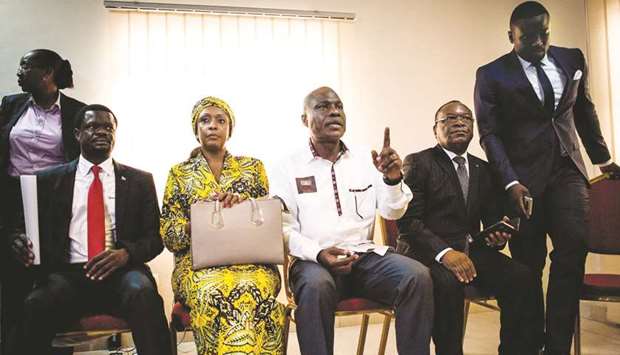If elections successfully take place on Sunday, it would mark the first peaceful transition of power in the DRC’s post-colonial history.
But many analysts strongly doubt that Kabila will quit politics.
Instead, they predict he will simply wield influence behind the scenes – a tactic likely to be emulated by two rivals, ex-rebel Jean-Pierre Bemba and Moise Katumbi, exiled former governor of Katanga province.
Kabila took power at the age of 29 after his president father, Laurent-Desire, was assassinated in 2001 by a bodyguard.
If Sunday’s thrice-postponed vote goes according to plan, Kabila will step down, taking up the senator-for-life position offered to former presidents.
Kabila has been vague about his future but, aged only 47, seems to have no plans to shuffle off into retirement.
“In life, as in politics, I do not rule anything out,” he told foreign media ahead of the polls.
He said his political future might be clearer in 2023 – the year the country is set to hold its next presidential polls.
Critics say Kabila plans to have the seat kept warm for him by his hand-picked successor, hardline former interior minister Emmanuel Ramazani Shadary, one of the front-runners in the election.
After nearly 18 years in power, Kabila has also built up a web of supporters in the military and security apparatus, as well as a loyal political vehicle, the Common Front for Congo (FCC), which earlier this year declared him to be its “moral authority.”
Kabila also reputedly has major stakes in the economy, which would also extend his potential influence.
A Bloomberg investigation two years ago found the Kabila family had built up a huge business network with interests across the DRC.
Former militia leader Jean-Pierre Bemba, 56, has been a fixture in DRC’s political landscape, and a rival to the Kabila clan, for years.
He was once an assistant to Mobutu Sese Seko, but left the country after Kabila’s father overthrew the dictator in 1997.
In 1998 he formed his Movement for the Liberation of the Congo (MLC) militia in armed opposition to Kabila senior.
He became vice president in an interim government in 2003, but in 2006 was defeated by Kabila junior in an election bid.
He was elected to the Senate the following year.
In 2008, Bemba was arrested in Brussels on charges of war crimes in the International Criminal Court over atrocities committed by his militia in the neighbouring Central African Republic.
In 2016, the ICC found him guilty of war crimes and crimes against humanity but this year overturned the decision on appeal.
But another ICC charge of witness bribery meant he was legally banned from an election bid.
Bemba has a major power base, especially in the northwestern DRC, and tens of thousands of cheering supporters turned out for his return in August.
Like Katumbi, he has backed Martin Fulyani, a little-known legislator and former oil executive, as a rival candidate to the pro-Kabila Shadary.
Millionaire businessman Moise Katumbi has also been barred from contesting Sunday’s election.
But the 53-year-old can still count on wielding influence on the DRC’s future through his backing for Fulyani.
His stronghold is the mineral-rich southeastern province of Katanga where he was once governor.

